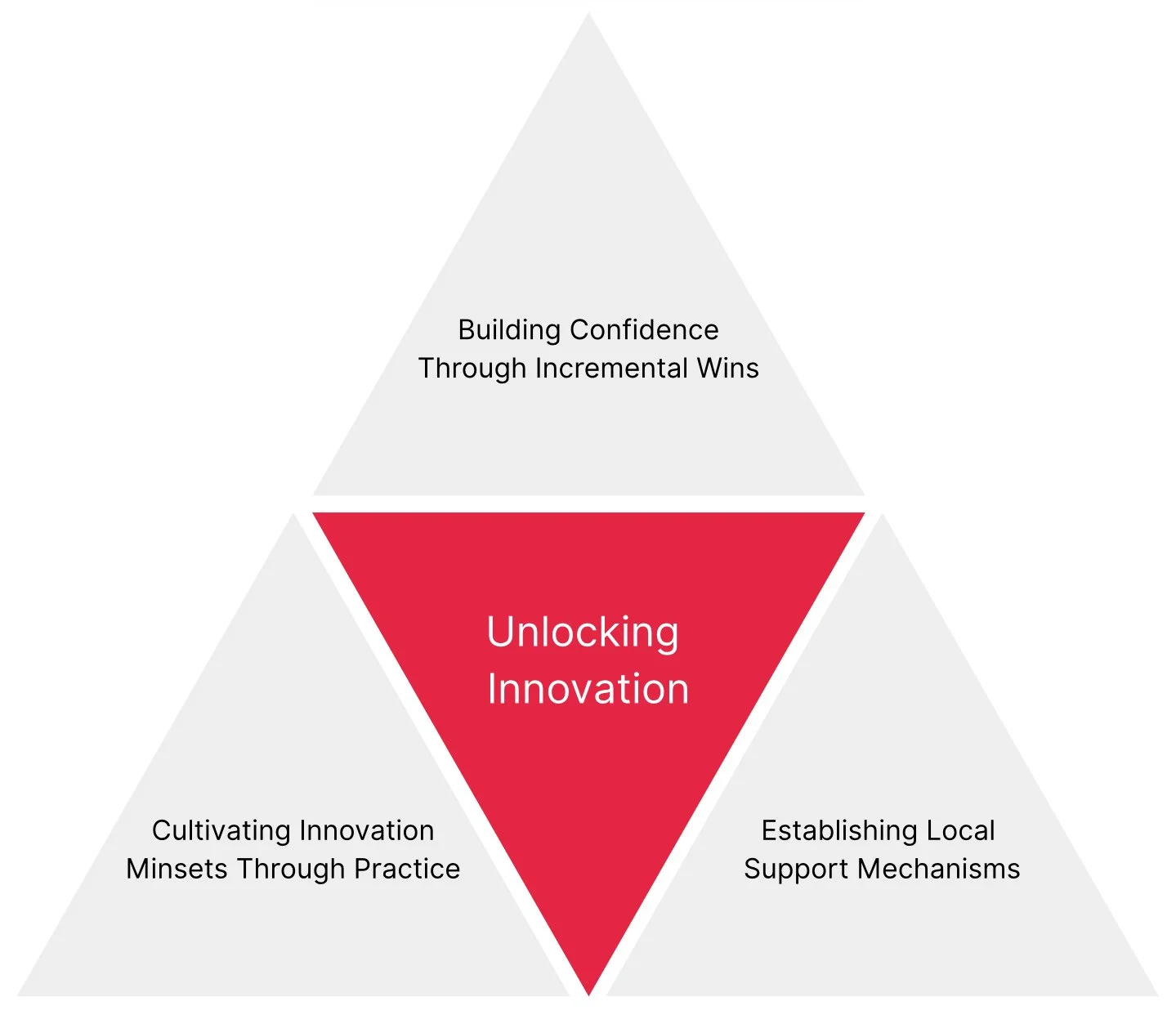What can Hollywood teach us about the emotional barriers to innovation?
Explore how Hollywood's underdog stories mirror the emotional challenges SMEs face in successfully innovating. Beyond external obstacles such as funding and talent acquisition, internal psychological barriers - like fear of failure and self-doubt - can significantly hinder progress. By recognising and addressing these human factors through IX, SMEs can be better supported to navigate their innovation journeys. To read more in our SME series, click here.
It’s no mystery why films like Rocky and La La Land are popular with audiences - they embody the classic Hollywood trope of the underdog. Against all odds, their protagonists overcome fear, self-doubt and external barriers to achieve their dreams. These narratives resonate with audiences as they showcase the very real, emotional barriers behind every success. And yet, outside Hollywood, in the world of business, these human barriers are almost entirely overlooked in conversations around innovation, especially for economic ‘underdogs’ like small-to-medium enterprises (SMEs).
For SMEs, innovation - whether through new products, services or processes, or accessing new customers and markets - is a critical tool for competing with resource-rich market leaders. Leveraging their smaller size as a mechanism for agility and customer-centricity, SMEs can quickly adapt to market changes and capture emerging opportunities. In this way, innovation can serve as an insurance policy, driving progress and resilience.
Discussions around SME innovation often focus on systemic challenges like securing funding, attracting talent, and navigating market dynamics. Without capital, SMEs must navigate a fragmented and competitive landscape of grants, loans and private investment, all while contending with stringent eligibility criteria, high interest rates, or demand for personal guarantees. When finding the right talent to action their ideas, it can be hard to compete with larger companies with deeper pockets and greater job security.
Whilst these external factors are critical to enabling innovation, the internal, psychological barriers faced by SME leaders can manifest earlier in the innovation process. For many entrepreneurs whose businesses evolved out of personal interests or passion projects, identity and self-esteem are deeply connected to its success. Just as Mia’s failed auditions took a toll on her confidence in La La Land, the risks that accompany innovation can be deeply personal for small business owners. These human barriers can prevent ideas from ever reaching the point of investment or scale where systemic support can make a difference.
What are these human barriers?
1. Fear of Failure
The ‘fear factor’ behind innovation isn’t a new topic. McKinsey & Co (2022) found that 85 percent of executives believe fear often or always holds back innovation efforts for employees in their organisations. In large corporates, this fear largely revolves around criticism, uncertainty, or the reputational damage that comes with being associated with so-called ‘failures’, and organisational ‘burnt topics’. For SMEs, this fear can hit a little closer to home. With fewer organisational or financial safety nets, failed innovations can leave small businesses highly vulnerable. Failed innovations might mean closing the business they’ve invested years of their life and finances into, facing the uncertainty of starting over, retraining or taking a salaried job that feels like a personal step backwards. According to Onward, impact on future job prospects is the top driver of this fear of failure for British entrepreneurs. For mid-career entrepreneurs, with mortgages to pay, families to support, and expertise tied to their business, the risk that is often inherent in change can be a hugely emotional barrier to cross.
2. Imposter Syndrome
Fear of failure is heightened by ‘Imposter Syndrome’: the behavioural phenomenon that causes individuals to doubt their intellect or skills, despite external validation or objective success. Imposter Syndrome too often affects solo founders lacking the support networks to champion their ideas, offer external expertise, and push them forward. Despite their entrepreneuralism, many don’t identify as “innovators” or see innovation only as large-scale market disruption. Some SME owners fear being unqualified to run their business if their ideas successfully materialise into growth, bringing with it uncertainty in scaling operations and managing more employees. This flawed belief system can derail innovation projects in several ways: first, by discouraging business owners from sharing their ideas with customers or peers, depriving themselves of valuable feedback and knowledge sharing; second, by causing them to doubt their decision-making, leading to stagnation; and lastly, by adopting ‘safe’ strategies that imitate competitors and more resource-rich brands rather than leveraging their own unique skill set.
3. The Status Quo Bias
For SMEs, success can breed rigidity. Successful strategies and ways of working can become entrenched, offering a false sense of security even when they stop delivering results. This status quo bias fosters a “but this is how we’ve always done it” mindset, where the comfort of proven and familiar methods outweighs the perceived rewards for innovation. While routines can be stabilising, they risk becoming barriers when growth entails change - whether by scaling operations, adopting new technologies, or pursuing unfamiliar markets. Viewing innovation as a disruption to stability rather than a natural progression traps businesses in outdated practices, leaving them vulnerable to inefficiencies or even financial losses.
4. Attachment to Ideas
Even for innovation-ready SMEs, emotional barriers can still get in the way of launching their ideas. Just as many writers can’t bear the thought of ‘killing their darlings’, businesses and entrepreneurs can form the same quasi-parental attachment to ideas that aren’t serving their goals. This can lead to over-investment in ideas without testing their underlying hypothesis first, or even ignoring market feedback that disproves it. This cognitive bias is often compounded by another - the sunk cost fallacy. We’ve seen numerous innovation projects stagnate because business owners are reluctant to pivot, evolve or let go of ideas in which they’ve already invested a significant amount of their time, energy and resources. By refusing to pivot from their first idea, SMEs are prevented from exploring new, value-generating ideas that could better serve the market and their own growth ambitions.
"These human barriers can prevent ideas from ever reaching the point of investment or scale where systemic support can make a difference.”
The Solution: Designing for the Innovator, Not Just the Process
While addressing systemic challenges remains crucial to fostering innovation amongst SMEs, the human side of innovation demands a shift in focus. A football manager can design the perfect strategy, but without building the skills and confidence of the players to implement it, the team cannot succeed. Similarly, supporting innovation activity requires empowering the individuals driving it - not just providing the right strategies, resources and frameworks. True progress comes from equipping SME owners with the mindset and emotional resilience to turn ideas into action. Like any great underdog story in Hollywood, success hinges on the people behind the effort, not just the plan.
Innovator Experience Design (IX): A Human-Centred Approach
This is where Innovator Experience Design (IX) comes into play - Studio Zao’s framework for applying a human-centred approach to the innovation pathway. Building on established approaches like User Experience (UX), Customer Experience (CX) and Employee Experience (EX), IX focuses on understanding the emotional behaviours, drivers, and blockers behind innovation in order to provide targeted interventions that unlock innovation-led growth amongst SMEs.
We have incorporated the IX approach into our work with SMEs by:
1. Building Confidence Through Incremental Wins
We embed innovation mindsets and capabilities into SME cultures by supporting participants to de-risk their ideas in a structured, low-pressure environment. By focusing on small, manageable steps, we help SMEs build confidence through incremental wins, fostering a habit of risk-taking that feels safe and productive. Central to this approach is shifting the focus from validation to invalidation—encouraging businesses to work in sprints that test assumptions, identify weak points, and embrace the learning opportunities that come from failure. This ‘fail fast’ mentality transforms risk into a valuable tool for progress rather than a deterrent.
2. Establishing Local Support Mechanisms
Launching new ideas often takes a village - of coaches, mentors, peers, and investors - and our support is purpose-built to build these essential connections. Through collaborative delivery mechanisms such as Bootcamps and Accelerators, we create peer networks that foster a strong sense of community and psychological safety, enabling participants to share experiences, seek advice, and champion one another. Unlike traditional networking spaces which often prioritise selling over sharing, we focus on creating an environment where innovation feels shared, achievable, and sustainable.
3. Cultivating Innovation Mindsets Through Practice
To make innovation a lasting practice, we focus on embedding the right mindsets and practices into SME culture, rather than treating it as a one-off effort. We support businesses to reshape their thinking, viewing innovation as the best insurance policy on the market. Through cognitive reframing and one-to-one coaching, we align innovation with long-term goals, positioning experimentation as an investment in resilience and adaptability. By normalising innovation as a continuous process, and an organisational value, SME teams can become better equipped to respond to external market changes, deliver greater value for their customers, and sustain growth over time.
Supporting Innovation at the Grassroots Level
While these interventions are crucial for existing SMEs, the journey needs to start even earlier. Cultivating innovation mindsets through practice in schools and educational systems can normalise entrepreneurship as a career path and help build the emotional-know and resilience required at an early age. Early exposure to concepts like the ‘fail fast’ mentality can create future generations of entrepreneurs and employees who are better equipped to innovate.


